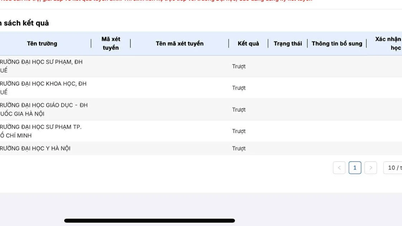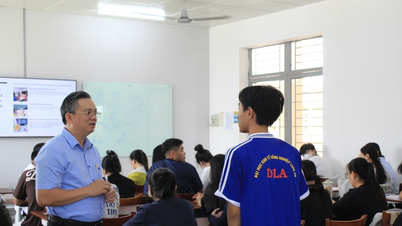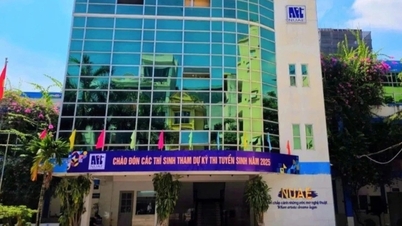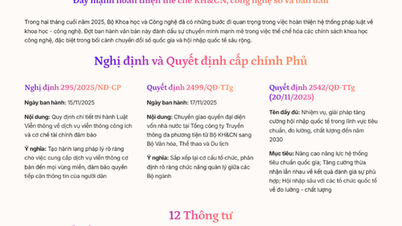6 majors with a benchmark score of 30/30
In 2024, no major in the country achieved the standard score of 30/30, but this year, there are 6 majors at 4 higher education institutions with this standard score. Those are 2 majors of Chinese and English pedagogy at the University of Foreign Languages (Hanoi National University).
These two majors also have absolute benchmark scores at the University of Education (Hue University). The major of international relations, Academy of Military Science and the major of medicine, Academy of Military Medicine for women this year also have benchmark scores of 30/30.
It is noted that in recent years, the benchmark scores of the University of Foreign Languages have never reached absolute levels. Explaining the "phenomenon" of benchmark scores for the two majors of English and Chinese pedagogy this year, Associate Professor Dr. Ha Le Kim Anh, Vice Principal of the University of Foreign Languages, said that the school has 5 admission methods. Candidates with foreign language certificates are converted. Most of the candidates applying for these two majors are excellent students, with high exam results, and have converted foreign language certificates with 10/10 points.
In addition, the school has regulations that students who win excellent student awards at the provincial and city levels, the Hanoi National University High School Olympic exam, SAT and A-level certificates will have their points added not exceeding 10% of the total score (maximum 3/30 points added).
In previous years, the University of Foreign Languages applied a 40/40 scale for foreign languages multiplied by a factor of 2, and the benchmark scores for the two pedagogical majors were always among the highest, 38.5/40 or 39/40. This year, with the added bonus points, the benchmark score was a perfect 30/30.
From the school's explanation, it can be seen that for candidates whose foreign language certificates are converted to 10/10 points, with 3 additional points from the prescribed awards, with regional bonus points and a maximum priority of 2.75 points, then for the remaining 2 subjects in the school's admission combination, candidates only need to achieve 14.25 points to be admitted.
But for candidates who only have high school graduation exam scores, without any other "lifesavers", even the valedictorian of this year's D01 combination (29/30 points) will not be admitted if they register for the University of Foreign Languages.
At the Military Medical Academy or the Military Science and Technology Academy, the enrollment quota for women is very small. For example, the Military Medical Academy has 2 quotas for Medicine, the Military Science Academy has 4 quotas.
Few quotas, some candidates are admitted directly according to regulations, candidates are given bonus points are the reasons that lead to the standard scores of 2 majors of 2 military schools rising to the absolute level.
"Strange" benchmark
Among the schools training in economics, Foreign Trade University is always in the top with the highest standard scores in the country. But this year's standard score of the school can be said to be the "strangest" ever.
In the high school graduation exam scoring method, the highest score for the business major (original combination A00) increased slightly compared to last year. The highest benchmark score was for the advanced foreign economic program, 28.5/30, compared to 28.1/30 last year.
In 2024, Foreign Trade University will have 12 majors/programs with a benchmark score of 28/30 points or higher, but this year there are only 2 majors. Last year, the lowest score in Hanoi and Ho Chi Minh City was 27.2/30 points, but this year there are 6 majors of the school with a benchmark score of 27 or higher.
The remaining programs basically have admission threshold scores concentrated around 25 to 27 points. In particular, there are majors with only 24 points for the A00 combination and 23 points for the D01 combination (political economics major). This is unprecedented in the benchmark score table of Foreign Trade University in the period 2019 - 2024. It can be seen that the benchmark score of Foreign Trade University this year is much lower than in previous years.

The school said that the Admissions Council builds the score conversion based on the percentage of candidates achieving the highest score threshold in each method and divides them into groups: 1%, 1 - 3%, 3 - 5%, 5 - 7%, 7 - 10%. The admission results show the uniformity of the methods in input quality.
In addition, the school does not add points to the IELTS certificate nor apply a low conversion score, with an IELTS score of 6.5 only being converted to 8.5 and to get a score of 10, candidates must have an IELTS score of 8.0 or higher.
The elimination of the high school transcript admission method and the reduction of the "lifeline" bonus points have helped the admission benchmarks of some universities return to their true nature, closer to the candidates' real abilities, even though the benchmarks are strange.
The benchmark score of the Diplomatic Academy is also quite “strange” recently. The method of considering the results of the high school graduation exam, the highest benchmark score is 26.09/30 points for the major of Chinese Studies.
While last year the highest benchmark score for this method was 29.2/30 points, the C00 combination (Literature, History, Geography), also in the Chinese Studies field, was 3.14 points higher. The lowest score in 2024 was 25.37/30 points, this year it was 24.17/30 points.
According to the explanation of the Academy, this year, there will be no bonus points for specialized schools; bonus points will be given to excellent students who have won prizes and low IELTS certificate conversion. In particular, the Academy will stop considering admission by using academic records. This year, there will only be two methods: considering high school graduation exam results and considering admission in combination with international certificates.
Injustice for students
Admission scores based on high school graduation exam scores at many universities, especially those in the South, will continue to increase in 2025, mainly due to the quota structure allocated between admission methods.
According to Associate Professor Dr. Do Van Dung, former Principal of Ho Chi Minh City University of Technical Education, based on this year's enrollment data, this situation not only reflects fierce competition but also exposes social, geographical and training quality injustices, seriously affecting students' access to higher education nationwide.

Southern universities such as Ho Chi Minh City University of Economics, Ho Chi Minh City University of Technology, Ho Chi Minh City University of Technical Education, and member universities of Ho Chi Minh City National University use methods such as reviewing transcripts, direct admission, and considering scores from the Ho Chi Minh City National University's competency assessment exam, so the quota is divided into small groups, leading to a situation of "low supply - high demand", pushing up the standard score.
Mr. Dung gave an example of the English teaching major of some universities, the quota allocated by the Ministry of Education and Training is very small. After deducting the number of direct admissions (quite a lot) and many admission methods, the quota for considering high school graduation exam results is only about 5 - 15. That explains why the standard score for this major is above 29/30.
An important but little-noticed reason is the way schools apply percentiles to convert transcript scores to high school exam scores. Due to concerns about not being able to recruit enough students, along with the large number of candidates registering to consider transcripts (accounting for 20-60% of the total quota in many schools), schools have come up with a conversion formula with a very small difference, usually only 1-1.5 points.
For example, a 29/30 grade point average (9.67/subject) is converted into 28/30 points for the high school graduation exam. This causes the overall standard score to be pushed up. This conversion formula is not strict and does not accurately reflect the difference in difficulty between the grade point average (which is easily “fabricated” or uneven between high schools) and the high school exam (which is standardized nationwide).
The consequence of the above, according to Associate Professor Do Van Dung, is that the benchmark scores are unusually high, eliminating many potential candidates. The benchmark scores based on high school exam scores often range from 24 to 26 points in many majors, even up to 30 points in some top schools, making it difficult for candidates with good but not outstanding academic performance to be admitted.
They are forced to turn to other methods, but not everyone has access. Students in remote areas are severely disadvantaged when separate exams are used by many schools, with results mainly concentrated in large cities and urban areas. Students in difficult, remote rural areas often do not have nearby exam locations and have to travel hundreds of kilometers, wasting money and time.
Students in remote areas mainly rely on high school exam scores, but the benchmark scores in many places are pushed up due to the above reasons, leading to unfair failures.
To overcome this, it is necessary to expand the locations of separate exams nationwide, tighten the criteria for considering academic records, adjust the percentile conversion formula more reasonably, and balance the targets between methods to ensure social equity and improve the quality of university education.
The method of considering transcripts is used by many schools but it is difficult to verify the quality and does not reflect actual ability. As a result, students who are considered by transcripts often cannot keep up with the program, causing great difficulties for lecturers. Uneven classes not only affect the quality of training but also create injustice for students, who have to compete fiercely but have to study with lower-level groups.
Bauhinia flowers
Source: https://tienphong.vn/tuyen-sinh-dai-hoc-2025-diem-chuan-la-phan-anh-xu-huong-nao-post1772220.tpo





![[Photo] Dan Mountain Ginseng, a precious gift from nature to Kinh Bac land](/_next/image?url=https%3A%2F%2Fvphoto.vietnam.vn%2Fthumb%2F1200x675%2Fvietnam%2Fresource%2FIMAGE%2F2025%2F11%2F30%2F1764493588163_ndo_br_anh-longform-jpg.webp&w=3840&q=75)





































































































Comment (0)